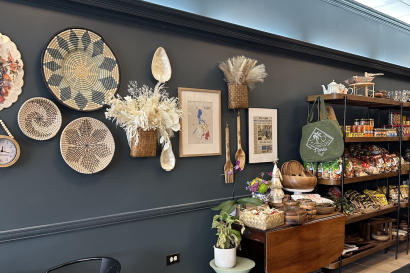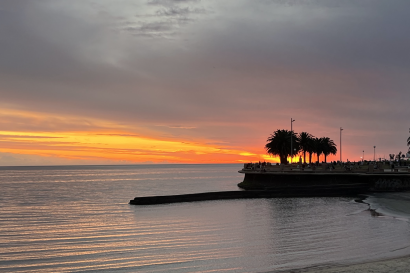
In the shallow stream, the tadpoles danced around my bare feet. These little amphibians moved predictably, reacting to the quake of my undulations. Sitting there on a rock, I looked out at our steep elevation gain. Troy, Jordan, and I had just completed our first river crossing of the hike. We were hiking from Villa La Angostura to a town miles away.
Troy and I had begun our journey in Buenos Aires. Being classmates and great friends, we had planned to start our pre-IES Abroad travels in Bariloche. There, in Bariloche, we met Jordan on the steps of a tourist center. She had both the knowledge necessary for hiking in Patagonia and the Spanish fluency. Within hours of meeting each other, we haphazardly drafted a hiking plan and immediately booked next-day bus tickets to Villa La Angostura. She ended up joining us for a month, becoming an essential member of our journey.
From Villa La Angostura, we hiked through miles of unspoiled terrain. Freshwater streams, beautiful statuesque trees, and divine mountains all around. Troy and I were dumbstruck on our first day. Our reality seemed a dream. It wasn’t just the two mysterious dogs that guided us through our first-day hike and suddenly disappeared into the woods (never to be seen again), but also the inconceivability of it all. We had known little of Patagonia, enough to talk about it but not nearly enough to attempt a hike. We had taken a leap of faith and made it all the way to Bariloche without a concrete clue of what to do. Then, like an angel, Jordan appeared during our growing panic.
We spent a few days living and hiking in the woods. Despite having travel companions, I scarcely spoke during those days. Speaking seemed silly. I had left the confines of the constant self-promotion of business school and thrown myself in the midst of all this natural beauty. How could I continue to falsely regard myself as an important being, as if human society really meant something in the face of mountains and cosmos?
After our hike, we arrived in Villa Traful. Expecting to find a run-of-the-mill campsite, we instead found a lakeside campsite with a panoramic view of the Andes. Villa Traful was a quaint town with a few campsites and exactly one grocery store. Falling in love with the views and the friendly populace, we ultimately spent a few days there. On the night of my 21st birthday, we had our first actual asado (an Argentinian BBQ), laughing and speaking Spanglish with Argentinian friends we had only met within the last few hours. There were many more times like this during our trip with local people and many from all over the world. Without all of them, our trip wouldn’t have been as rewarding.
From Villa Traful, we eventually bussed to San Martin de los Andes. We trekked around Lago Lacar for a few days, having the opportunity to appreciate the campsites and the rocky beaches around the lake. Dave tagged along with our trio. Dave was a stray dog that traveled with us for days, switching between following us and following an Argentinian trio also trekking around the lake. This time was beautiful. There’s something astounding about seeing movement in nature from "non-living" things, the water as it flows continuously from seemingly nowhere; the quilts it forms with interweaving currents, currents only formed by the ability of the water to readjust its course to flow past the countless minutiae—rocks, branches, logs.
Eventually, we went back to Buenos Aires to begin our Uruguay trip. We began in Colonia and our plan was to work our way up the coast. We stopped in Montevideo, but we never left our next stop, a small, hippie beach town we found by chance. We loved it there so much that we elected to take a 5:40am bus to make it back in time for our ferry. During our time there, the days were never planned (as always but even more so there), but it always turned out to be a great time. Situated on the beach, sand dunes on the coast, and overlooking the Atlantic Ocean, one would think the value came from the location. But it was all about the people, both locals and vacationers, who were the happiest people I had ever met.
Paradise didn’t last forever though. We headed back to Buenos Aires before the start of our program. That same day, we said our goodbye to Jordan, who was going to continue backpacking in Latin America. The rest of that day was melancholy, both Troy and I being unable to conjure any excitement. It’s at these times you become acutely aware that words are only accessories to ideas. No matter what you say or write, you can never encapsulate the ideas. The intensity of the neurotransmitters activated during those past moments have long subsided and all that remains are memories. Even if you wanted to express the significance of the memories, the words would never be enough.
The ideas, however abstract, do have an internal impact.
Before our program start and during a hostel stay, we had dinner with two students like us, one from Germany and the other from Brazil. We sat outside, the motley buildings of Buenos Aires as the backdrop. Somehow, the conversation steered into the area of moral ambiguity in books and movies: of how the idea of moral ambiguity is something that is only introduced later in someone’s life, because the idea that polarities don’t actually exist would trip little kids out.
During this somewhat unnecessarily intense intellectual conversation, it hit me how all four of us were just humans saying stuff. The travels of the month had gone but what was left was the internal objectivity, the objectivity necessary to make the most out of my time in the IES Abroad Multi-Location – Emerging Economies Program ;). We’re just another species (less predictable than amphibians) trying our best to create a functional society that allows us to live. We’re animals constantly conversing and debating with each other to find the best ways to make that happen.

Omar Uddin
<p>My name is Omar, and I am a student in the Ross School of Business at the University of Michigan. As a major in Business Administration, I'm primarily concerned with how business practices can be leveraged in the social impact realm. I'm hoping I will be able to use all that I have learned and all that I will learn to have a positive effect on society.</p>







